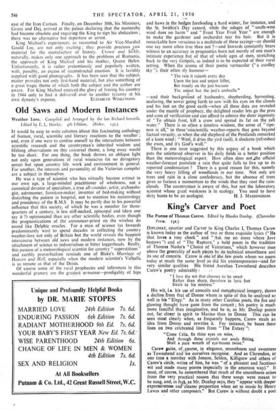Old Saws and Modern Instances
Weather Lore. Compiled and Arranged by the late Richard Inwards. Edited by E. L. Hawke. 4th Edition. (Rider. 15s.) IT would be easy to write colurrins 'about this fascinating anthology of human, rural, scientific and literary reactions to the weather ; and, even if one were to confine oneself to the interactions between scientific research and the countryman's inherited wisdom and lifelong observations on this universal theme, a long essay would be too short. For one thing, the book throws an oblique light not only upon generations of rural wiseacres (in no derogatory sense) but upon country life. work and environment in general. For another, the interests and personality of the Victorian compiler are a subject in themselves. He was a type of scientist who has virtually become extinct in our own age, a large-minded practitioner of wholeness, not a canonical devotee of specialism, a true all-rounder, artist, archaeolo- gist, astronomer, furniture-maker, inventor of bed-making without disturbing the patient in hospital, not to mention his meteorology and presidency of the R.M.S.It may be partly due to his powerful influence that this society, of which he was a member for three- quarters of a century, is less stiff-necked, episcopal and (dare one say it ?) opinionated than are other scientific bodies, even though the prognostications of the announcer-priest on the wireless do sound like Delphic oracles. For a man of science (as Inwards predominantly was) to spend decades in collecting the country weather-lore not only of Britain but the world reveals the happiest intercourse between old saws and modern instances, now by the attachment of science to industrialism at bitter loggerheads. Really, this passion of a meteorological scientist for country " superstitions " and earthly proverbialism reminds one of Blake's Marriage of Heaven and Hell, especially when the modern scientist's Valhalla is as remote as that of the Deists.
Of course some of the rural prophecies and inferences in this wonderful granary are the greatest nonsense—prodigality of hips and haws in the hedges foreboding a hard winter, for instance, and the St. Swithin's Day canard, while the adages of " south-west wind does no harm " and " Frost Year Fruit Year " are enough to make the gardener and orchardist tear his hair. But it is remarkable how veracious is a multitude of these sayings—or should one say more often true than not ?—and Inwards constantly bears witness to an accuracy in prognostics born not merely of one man's intimate experience but of that of whole ages of men, stretching back to the very Gospels, as indeed is to be expected of their rural setting. When the aroma of their poetic vernacular (" a curdley sky "), their often sly humour- " The rain it raineth every day Upon the just and unjust feller,
_ But mostly on the just because
The unjust has the just's umbrella " —and their backgroftnd of husbandry, shepherding, harvesting, seafaring, the sower going forth to sow with his eyes on the clouds and his feet on the good earth—when all these data are revealed under the mantle of prophecy, the delighted reader lets go the pros and cons of verification and can afford to admire the sheer ingenuity of " To obtain frost, kill a crow and spread its fat on the salt water." There is so c4ten a timeless wisdom, the sense of " ripe- ness is all," in these 'unscientific weather-reports that goes beyond factual veracity, as when the old shepherd of the Pentlands remarked of a keen wind : " Weel, it dries the yird (soil), it slockens (refreshes) the ewes, and it's God's wull."
There is one issue suggested by this argosy of a book which puts the unlettered observer in his daily fields in a better position than the meteorological expert. How often does not .the official weather-forecast postulate a rain that quite fails to live up to its reported condensation ? There is a good reason for this, namely the very heavy felling of woodlands in our time. Not only are trees and rain in a close confederacy, but the absence of trees gives so furious a momentum to the winds that they rout the rain- clouds. The countryman is aware of this, but not the laboratory scientist whose great weakness is in ecology. You need to have






































 Previous page
Previous page